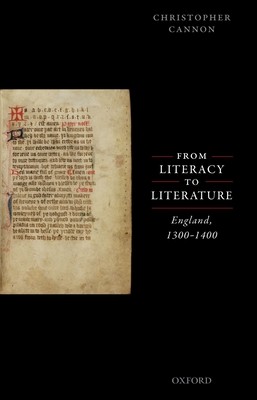
- We will send in 10–14 business days.
- Author: Christopher Cannon
- Publisher: Oxford University Press, USA
- ISBN-10: 0192856359
- ISBN-13: 9780192856357
- Format: 14 x 22.3 x 2 cm, softcover
- Language: English
- SAVE -10% with code: EXTRA
Reviews
Description
The first lessons we learn in school can stay with us all our lives, but this was nowhere more true than in the last decades of the fourteenth century when grammar-school students were not only learning to read and write, but understanding, for the first time, that their mother tongue,
English, was grammatical. The efflorescence of Ricardian poetry was not a direct result of this change, but it was everywhere shaped by it. This book characterizes this close connection between literacy training and literature, as it is manifest in the fine and ambitious poetry by Gower, Langland
and Chaucer, at this transitional moment. This is also a book about the way medieval training in grammar (or grammatica) shaped the poetic arts in the Middle Ages fully as much as rhetorical training. It answers the curious question of what language was used to teach Latin grammar to the illiterate.
It reveals, for the first time, what the surviving schoolbooks from the period actually contain. It describes what form a 'grammar school' took in a period from which no school buildings or detailed descriptions survive. And it scrutinizes the processes of elementary learning with sufficient care to
show that, for the grown medieval schoolboy, well-learned books functioned, not only as a touchstone for wisdom, but as a knowledge so personal and familiar that it was equivalent to what we would now call 'experience'.
EXTRA 10 % discount with code: EXTRA
The promotion ends in 18d.15:58:43
The discount code is valid when purchasing from 10 €. Discounts do not stack.
- Author: Christopher Cannon
- Publisher: Oxford University Press, USA
- ISBN-10: 0192856359
- ISBN-13: 9780192856357
- Format: 14 x 22.3 x 2 cm, softcover
- Language: English English
The first lessons we learn in school can stay with us all our lives, but this was nowhere more true than in the last decades of the fourteenth century when grammar-school students were not only learning to read and write, but understanding, for the first time, that their mother tongue,
English, was grammatical. The efflorescence of Ricardian poetry was not a direct result of this change, but it was everywhere shaped by it. This book characterizes this close connection between literacy training and literature, as it is manifest in the fine and ambitious poetry by Gower, Langland
and Chaucer, at this transitional moment. This is also a book about the way medieval training in grammar (or grammatica) shaped the poetic arts in the Middle Ages fully as much as rhetorical training. It answers the curious question of what language was used to teach Latin grammar to the illiterate.
It reveals, for the first time, what the surviving schoolbooks from the period actually contain. It describes what form a 'grammar school' took in a period from which no school buildings or detailed descriptions survive. And it scrutinizes the processes of elementary learning with sufficient care to
show that, for the grown medieval schoolboy, well-learned books functioned, not only as a touchstone for wisdom, but as a knowledge so personal and familiar that it was equivalent to what we would now call 'experience'.


Reviews